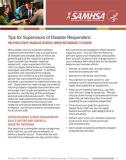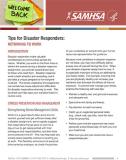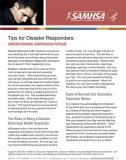
This fact sheet offers tips supervisors can use to help ease the transition and manage stress for disaster response workers returning to work. It helps people recognize and reduce potential difficulties in the workplace, and enhances positive consequences for all staff.
Units per Product
Download
Helping Staff Manage Stress
File Type: PDF
File Size: 660 KB







